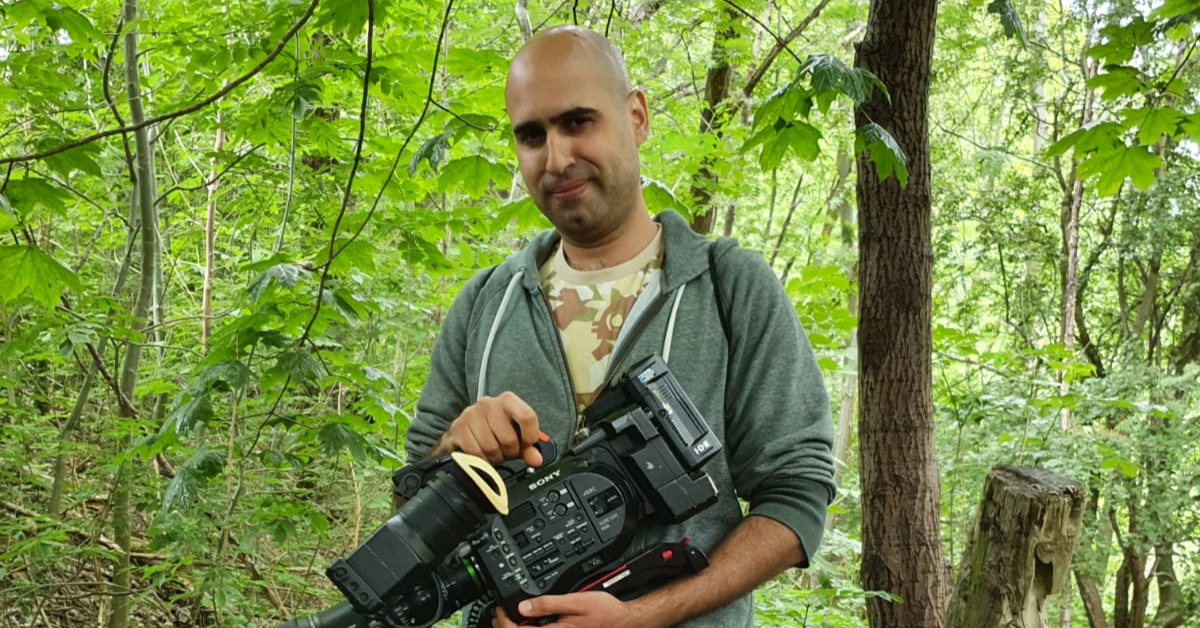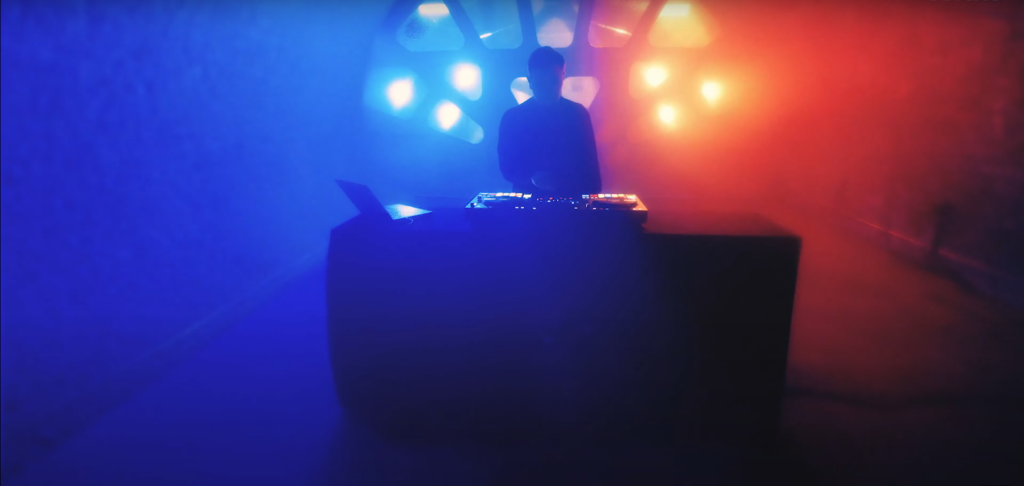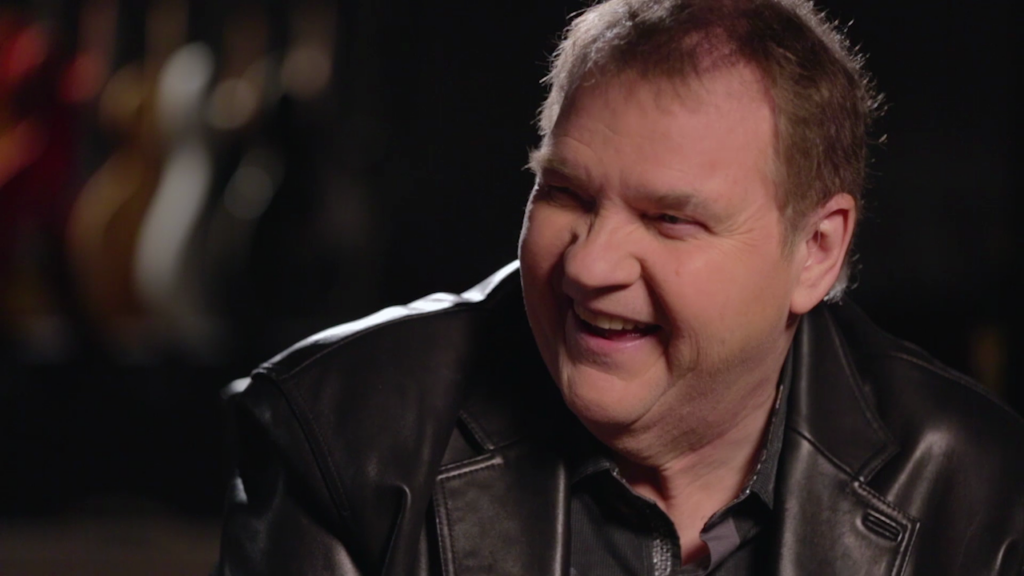
George Petais: Freelancer of the Month
We love having you on the books as a freelancer George – and we’re interested to know something, you have experience as a Director of Photography (DoP) and Camera Operator. Which role brings you more joy, and why?
Both job roles, over the years, have had the ability to bring joy. Whether, I am DoP(ing) or Camera OP(ing), the joy usually happens from a retrospective point of view for me. When what I have shot, lit, framed and captured or the moment I see for myself was used – or the surprise of something that was not necessarily supposed to be used comes out in the finished article and comes together nicely then I feel a sense of satisfaction with the outcome. Of course, joy comes in other situations too, like when what you have planned in preproduction works right away on set, as if by magic.
Much joy comes from the people or subjects you end up filming (Brian Blessed, the musician – Meatloaf, Gourmet Food and Puppies are a few that stick in my mind as creating a smile).
Personally, I enjoy the challenges that both roles can throw you. With all the will in the world, you cannot avoid those moments when things don’t quite work out and you have to think on your feet.
Whether it’s quick fixes of equipment minutes before filming a big event or making a handheld rig out of gaffer tape for a 5D from a monitor clamp, I like the feeling of rising to the challenge. And, my recent and new favourite example has got to be, the making of a mic stand out of a wooden train set.
But perhaps, overall…the real joy is the people, friends and experiences you can make on the way…the job is just the vessel.
After years of experience in the industry, working in different genres such as broadcast and corporate, which one is your favourite and why?
To pick a favourite would be unjust to the other genres. Working in broadcast has the opportunity to take you to some interesting places and scenarios. I have also experienced this with corporates, promo branded content and live music, so a favourite is hard to pick. But, I have to say that one of my favourite jobs was an expenses only job for a friend and colleague. The job was a live stream in a local music venue – I loved the electric buzz of it all! It was an evening of reggae music (I love the reggae), I was using my – then – new Sony FS7 and the gig was just down the road from where I grew up so I felt like it was a nice moment. The job being a Live stream also meant when I was done, I was done, and it felt like a positive experience.
At some stage, I reached a symbiosis with myself, the camera and the music. It didn’t feel like work at all. A Zen like experience.
These compounding positive elements definitely puts it out on the top for me. So…Live music would be a favourite (but don’t tell the other genres). I even have the poster for the event up in my office.
‘[…] you can make organic connections happen like getting work from people because you are recommended […] This does not come overnight but through years of hard work and building connections’
Are there any interesting anecdotes from your time shooting or being on set that you would like to share with us?
When you meet Camera OPs, DoPs and other crew, everyone will have anecdotes (Don’t eat the food on a cooking show! This person is nice to work with. This one isn’t! The list goes on…).
But…I did find myself in a field with Brian Blessed and a re-enactment group of Roman centurions firing catapults. We had to stop for sound as we were near a flight path. Mr Blessed would absolutely lose it at the planes and helicopters, when they were passing by, with threats of destruction and coarse language. All in jest, of course, but seeing the main actor from Flash Gordon do it was very entertaining. During the lunch break, the re-enactment crew were gathered around him like children listening to a storyteller.
Another that comes to mind, would be back when I was a camera assistant working on a day shoot at Gordon Ramsay’s London home. A Gentleman dressed in casual clothes: jeans, leather jacket, beanie hat etc, arrived half way through the day and proceeded to shake everyone’s hand that was on set. It was between takes and I was spannering away at something on the camera but he shook my hand which I did semi-distracted, still busy doing camera assisting stuff, I noticed something familiar in this gents face only after a few more handshakes of the crew. I finally clocked who it was – it was only one of the most famous footballers…David Beckham. Thank goodness I didn’t say what I nearly went to say which was “Who is that guy?” I blame my delay for the not realising who it was sooner on the fact that he wasn’t in his England football kit.
What are your goals within the industry? And, what would you consider your greatest professional success so far?
Mainly to keep using the skills I have gathered over the years through the many experiences that I have gained and just keep working, learning and growing. And, to continue to be open to seeing where it takes me.
Personally, I feel success comes with getting the jobs in, in the first place, its hard out there at the moment and using skills to pay the bills is a real achievement as I continue to be successful at getting a variety of work in week to week, but it is never promised so I never want to take it for granted and I see every job in as a real success.
That moment you can make organic connections happen like getting work from people because you are recommended, no credentials needed as you’re seen as safe hands in which to place the job and a trusted person to get the job done to the standard expected. This does not come overnight but through years of hard work and building connections. I have found that being honest, open, asking questions and not pretending you know it all but being willing to learn along the way and work as a team player has all benefited making connections over the years. All my connections are moments of success.
A recent success has been DoPing on an online promo for a Dj software company. It was a lot of things to juggle, but the job came to me at the right stage of my career. It included working on the preproduction, crewing, hiring kit, working from a story board and working for a client in a different time zone. I was very happy with the outcome and it was received very well. I would consider it a professional success.
How do you approach collaborating with directors and other key members of the production team to ensure the visual style and tone of a project align with their vision?
Reading people well and listening to what they want to achieve is essential. Being flexible to different individuals and adapting to their style of working is a must. For some people, having eyes on the monitor and guiding the process is essential and this can work in a way that gives quick, clear feedback that allows me to ensure we are aligned with their vision but this does not always need to be the case to have a positive outcome. Some people will want full control and to know all the details; others will say, “I trust you to get it!” and have every faith in you to use your own artist license. It’s a wide spectrum. I like to be open to work in ways that best suit the particular person that is in front of me and go in open minded.
In the digital age, it has become easy for someone to send a link from a video saying they want it in a certain visual style or use a shot list and story board. This way it can be more of a kind of painting by numbers but can really ensure that the visual style is easily achieved in the correct way.
You have to be a chameleon. I like to offer something up that helps achieve the end goal when helpful to do so but, in turn, ready and listening to hold a particular direction and visual style that someone wants to achieve for the project.
How do you balance artistic creativity with technical proficiency in your role as a Director of Photography?
It’s a balancing act for sure! One likes to think I am somewhere in between. From what I have observed from others in the same department, there are the hyper creative types – who get great shots. And, there is the Tec Head – who get great shots too! I do what I can to keep my head in both realms.
For the artistic side: art, culture, books, photography, films, television and videogames. For
technical, there are a lot of powerful resources: books, online, Facebook groups and Reddit on technical specific aspects and asking people/word of mouth. For me, personally, I find giving myself the time to just play around with the camera and applying my core skills can really give me the chance to practise balancing both.
The eternal question: film negatives or digital and why?
A classic question. I have not shot anything on film, only stills when I was at college. This was only a short time in my BTEC, at the age of 17, where we shot and developed black and white 35mm stills – it was a magic experience! What I would say is the Lord of the Rings movie is shot on film; the Hobbit isn’t. I think the Lord of the rings looks better. I think that you should just use the format that you think works for your story. Paramount to that, if your story/ message is good then people won’t care what it was shot on.
What type of lighting do you prefer to use, and which equipment/kit makes you feel more comfortable working with?
Last year, I purchased an Aputuer Amran Light 200x – it’s a very affordable light as lighting kit goes. It has been used on most of the jobs I bring it on; it is very punchy for a small light. It has lit both interviews and also scenes on stage etc. I have to say that I am a fan of natural light that comes from outdoor shoots.
Though, with any bit of kit, after a few hours or days of use, you get used to it. You develop a muscle memory and you can be comfortable with it. An FS7 feels like an old pair of jeans you get used to and the FX9 the new and improved comfortable jeans. You want to get to the stage where the kit is an extension of you, that is comfort (whatever the kit is).
Can you tell us about your first shooting or filming experience? How was it?
When I was 16 years of age, at the early stage of a BTEC course, we were given DV cameras and told to go out and shoot Vox Pops on a subject of our choice which later would be edited by us as well. It was an exciting feeling going out to shoot and then video editing afterwards – it was a new sensation and quite the revelation…my education could be fun!
In your opinion, what is the most challenging aspect of being a DoP?
One of the most challenging aspects of it, is probably getting the employment in the first place. At this current time, there are a lot of people feeling the pinch and that seems to me to be a across the whole Media/Videoscape (I also hear the same in the events side of things too). The other challenge is purely the gauntlet of being self-employed.
Who are your role models or references in the industry, and how have they inspired you?
An experienced DoP who I worked with when I was a green camera assistant, back in 2009, who I still work with today was a huge encouragement to me over the years. He gave me the chance to shoot on an unpaid project which lead to more paid work through the years.
It is probably a cliché but, when I was younger, Robert Rodriguez and his the book, ‘A Rebel without a Studio’ inspired me to just go out and make a short film. I was 17 years old at the time, most people’s first shorts are not very good at that age and stage but I learnt a hell of a lot.
Here you can see George Petais’s showreel. To find out more about George and other freelance production talent, please contact a member of the team.



